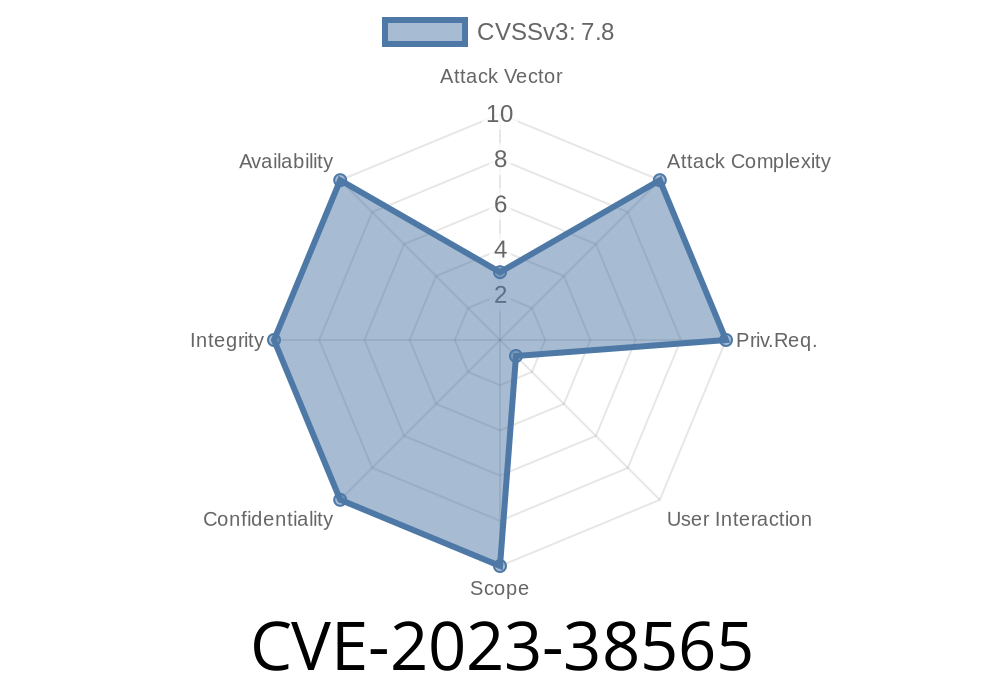---
Overview
In 2023, Apple quietly patched a dangerous security vulnerability—CVE-2023-38565—across several operating systems, including macOS (Monterey, Big Sur, and Ventura), iOS, iPadOS, and watchOS. This bug was lurking in the way these systems handled file paths. If exploited, it could let a malicious app gain root privileges, potentially giving attackers full control over a device.
Let’s break down the vulnerability, look at a simple code example, discuss how an attacker might exploit it, and see what you can do to protect your devices.
The Issue: Path Handling Gone Wrong
Path handling simply means how an operating system treats file and directory names, especially when those paths are user-controlled or come from outside sources.
In CVE-2023-38565, a flaw in this area allowed crafted paths to bypass normal security checks. The root cause: insufficient validation. Imagine if someone gave you a note saying, “the key is under the doormat,” but the note was actually a trick to lead you to the wrong key—this is similar.
Apple’s summary
> “A path handling issue was addressed with improved validation. This issue is fixed in macOS Monterey 12.6.8, iOS 16.6 and iPadOS 16.6, macOS Big Sur 11.7.9, macOS Ventura 13.5, watchOS 9.6. An app may be able to gain root privileges.”
> *(Source: Apple Security Updates)*
Exploit Details
While Apple keeps the nitty-gritty technical documentation secret to protect users, here’s how attackers commonly abuse path handling bugs:
- Trick the system into reading/writing files outside of restricted zones using sequences like ../ (“directory traversal”).
Replace important files or scripts with malicious versions by targeting misvalidated file paths.
- Escalate privileges if the vulnerable operation is performed with root/admin rights.
Potential attack scenario
1. Malicious app on a Mac or iOS device crafts a file path including ../, forcing the system to look outside of a safe directory.
2. The malformed path points to a critical system file (e.g., /etc/sudoers).
The system mistakenly grants the app access, believing it’s a legitimate action.
4. The attacker can replace, modify, or read privileged files—potentially granting themselves root access.
Code Example: Directory Traversal
Here’s a simple Python example mimicking what vulnerable code might look like.
*(Note: This is for educational purposes only!)*
import os
def unsafe_open(user_input):
# Intended to open files only in /safe_directory
base_path = '/safe_directory'
target_path = os.path.join(base_path, user_input)
with open(target_path, 'w') as f:
f.write('hello world')
# User controls the input
unsafe_open('../../etc/passwd') # BAD: Writes to /etc/passwd!
With the right input (../../etc/passwd), the system waltzes out of /safe_directory and writes to a protected file.
The Fix: Improved Validation
Apple’s patch properly checks for sneaky paths and validates them, so only legit files inside allowed directories are touched. For example, it might:
Here’s how that code *should* look
def safe_open(user_input):
base_path = '/safe_directory'
target_path = os.path.join(base_path, user_input)
real_target_path = os.path.realpath(target_path)
if not real_target_path.startswith(base_path):
raise Exception("Invalid path!")
with open(real_target_path, 'w') as f:
f.write('hello world')
Now, any attempt to escape the safe folder is blocked.
watchOS (before 9.6)
*See Apple Security Updates for the full details.*
Should I Worry?
If your devices are updated to these or newer versions, you’re safe. If not—yes, you should!
More Reading
- Apple Security Release Notes: CVE-2023-38565
- MITRE CVE Record: CVE-2023-38565
- Directory traversal attack explanation (OWASP)
In Summary
CVE-2023-38565 was a big deal: it’s a reminder that even small mistakes in handling file paths can lead to total system compromise. Apple acted fast, but it’s up to you to make sure you’re running the latest software. Update your devices, and always be careful with file paths—whether you’re coding or just using your machine.
Timeline
Published on: 07/27/2023 01:15:36 UTC
Last modified on: 08/03/2023 16:42:43 UTC
